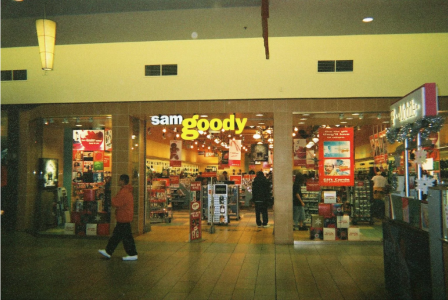Once-famous music store chain closing for good—the untold story behind it
By
Aubrey Razon
- Replies 0
The music industry has seen countless changes, from vinyl records to streaming services. Now, a once-iconic music retailer is shutting its doors for good.
Discover how a small side hustle became a giant in the industry.
It all started in 1951, in the bustling streets of New York City. Sam “Goody” Gutowitz, a man with an entrepreneurial spirit and a love for music, opened a small toy and novelty shop.
Little did he know that his side gig of selling records would strike a chord with the American public.
The business quickly crescendoed into a full-fledged music empire, as Sam Goody introduced mail-order services and slashed prices, making music more accessible to the masses.

Sam Goody's innovative approach to music retail, with its vast selection and affordable pricing, resonated with consumers.
The brand's popularity soared, and by the 1980s, Sam Goody stores were a common sight in shopping malls across the nation.
At its peak, the chain boasted over 800 stores, and for many Americans, it was synonymous with music discovery and culture.
For those of us who remember the golden age of music retail, Sam Goody was more than just a store—it was an experience.
Flipping through the latest vinyl releases, listening to the chart-topping hits on a CD player, or attending a midnight release party for a new album; these are memories etched in the hearts of music enthusiasts.
The store was a hub for community and culture, where fans could meet and share their love for music.
However, the symphony couldn't last forever.
The advent of digital downloads and streaming services, coupled with the convenience of online shopping, struck a dissonant chord with physical music stores.
The industry's shift towards digital media rendered traditional retail outlets like Sam Goody less relevant.
Despite the headwinds, the chain managed to maintain a presence in some communities, a testament to its enduring legacy.
Now, as we approach the closure of the last two Sam Goody stores in Oregon and Ohio, we witness the end of an era. Rick Polanski, the manager of the Ohio Valley Mall location, encapsulates the sentiment shared by many: a mix of nostalgia, pride, and the bittersweet realization that times have changed.
“I put two-thirds of my life into this place. We were a $2 million store at one point, but times have changed, and there’s nothing I can do about it.”
While the physical stores may be disappearing, the spirit of Sam Goody lives on.
The brand's journey from a side hustle to a national phenomenon is a powerful reminder of the impact that passion and innovation can have on an industry.
Sam Goody's story is not just about the rise and fall of a retail chain; it's about the evolution of music consumption and the memories that soundtrack our lives.
As we say goodbye to Sam Goody, we celebrate the role it played in shaping music history.
The stores may be silent, but the melodies will resonate forever in the collective memory of a generation.
 Did you have a favorite Sam Goody memory or a special album you purchased there? How do you feel about the transition from physical music stores to digital platforms? Share your thoughts and stories with us in the comments below.
Did you have a favorite Sam Goody memory or a special album you purchased there? How do you feel about the transition from physical music stores to digital platforms? Share your thoughts and stories with us in the comments below.
Let's honor the legacy of Sam Goody together and keep the music playing in our hearts.
Discover how a small side hustle became a giant in the industry.
It all started in 1951, in the bustling streets of New York City. Sam “Goody” Gutowitz, a man with an entrepreneurial spirit and a love for music, opened a small toy and novelty shop.
Little did he know that his side gig of selling records would strike a chord with the American public.
The business quickly crescendoed into a full-fledged music empire, as Sam Goody introduced mail-order services and slashed prices, making music more accessible to the masses.

Sam Goody, the iconic music retail chain, is closing its last two stores in the US, marking the end of an era. Image source: u/Tony_Tanna78/Reddit.
Sam Goody's innovative approach to music retail, with its vast selection and affordable pricing, resonated with consumers.
The brand's popularity soared, and by the 1980s, Sam Goody stores were a common sight in shopping malls across the nation.
At its peak, the chain boasted over 800 stores, and for many Americans, it was synonymous with music discovery and culture.
For those of us who remember the golden age of music retail, Sam Goody was more than just a store—it was an experience.
Flipping through the latest vinyl releases, listening to the chart-topping hits on a CD player, or attending a midnight release party for a new album; these are memories etched in the hearts of music enthusiasts.
The store was a hub for community and culture, where fans could meet and share their love for music.
However, the symphony couldn't last forever.
The advent of digital downloads and streaming services, coupled with the convenience of online shopping, struck a dissonant chord with physical music stores.
The industry's shift towards digital media rendered traditional retail outlets like Sam Goody less relevant.
Despite the headwinds, the chain managed to maintain a presence in some communities, a testament to its enduring legacy.
Now, as we approach the closure of the last two Sam Goody stores in Oregon and Ohio, we witness the end of an era. Rick Polanski, the manager of the Ohio Valley Mall location, encapsulates the sentiment shared by many: a mix of nostalgia, pride, and the bittersweet realization that times have changed.
“I put two-thirds of my life into this place. We were a $2 million store at one point, but times have changed, and there’s nothing I can do about it.”
While the physical stores may be disappearing, the spirit of Sam Goody lives on.
The brand's journey from a side hustle to a national phenomenon is a powerful reminder of the impact that passion and innovation can have on an industry.
Sam Goody's story is not just about the rise and fall of a retail chain; it's about the evolution of music consumption and the memories that soundtrack our lives.
As we say goodbye to Sam Goody, we celebrate the role it played in shaping music history.
The stores may be silent, but the melodies will resonate forever in the collective memory of a generation.
Key Takeaways
- Sam Goody, the iconic music retail chain, is closing its last two stores in the US, marking the end of an era.
- The two remaining stores are located in Oregon and Ohio, with the Ohio store having been a local fixture since 1980.
- The chain began as a toy and novelty shop in 1951 and expanded nationwide at its peak, with over 800 stores.
- The decline of physical music stores due to the rise of digital downloads, streaming services, and online shopping has led to Sam Goody's closures, leaving fans and former employees nostalgic for the brand's heyday.
Let's honor the legacy of Sam Goody together and keep the music playing in our hearts.






